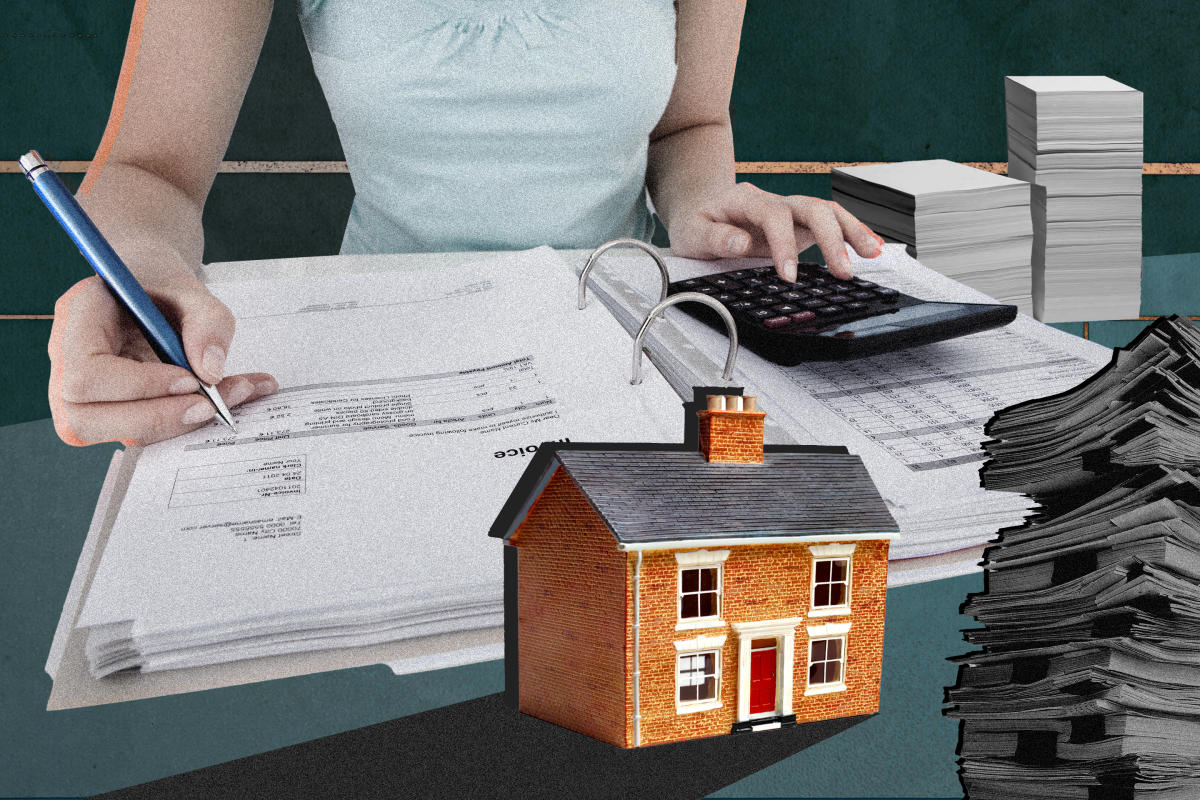Personal Finance
6 Tips for Homeowners Who Are Struggling to Pay Their Mortgage

The last thing you think about when buying a home is that someday you might lose it.
The sad truth, however, is that a big part of homeownership is taking on that risk, and despite your best laid plans, sometimes life zigs when you want it to zag and you find yourself facing financial difficulties.
More homeowners are starting to face that dilemma right now, thanks to the uncertain economic conditions and recent spate of layoffs. The number of Americans filing for foreclosure was up 115% last year, according to real estate data provider ATTOM. Even though the current number of homes in foreclosure proceedings is well below pre-pandemic levels, the number has been steadily rising for the past 21 months and is likely to continue increasing.
For many homeowners, the prospect of becoming delinquent on their home loan is so scary that it can be paralyzing, often making the situation worse.
“A mistake a lot of people make is they kind of wait to do anything about it until they’re already behind on their mortgage,” says Jerimiah Taylor, vice president of real estate and mortgages at real estate tech firm OJO.
Trying to dig out of a precarious financial position once you’re already behind makes it harder to get relief, Taylor adds. Instead, he recommends that homeowners take a proactive approach and start looking for options before they fall too far behind.
It’s better to have a plan for what to do if you’re struggling with your mortgage payments than to have to scramble for a solution once it’s too late. These tips can help you prepare for the unthinkable.
1. Streamline your finances
Do you know how you spend all your money? You may have a broad idea of where the bulk of it goes, or you may be in the minority that is able to pinpoint exactly where each penny you earn goes. Either way, it’s crucial to take an honest look at your finances and see if there are ways to free up some cash to help you pay your bills.
Chris Smith, co-founder of the real estate marketing firm Curaytor, likens the process to the way airlines spent decades trying different types of fuels and engines to improve aircraft efficiency only to find that reducing friction along an aircraft’s wings was a much better way to achieve the desired result. The same applies to your money.
“Get serious about removing friction from the dollars that are already coming in,” Smith says.
Translation: Figure out where each dollar goes, whether you need to spend it there and how much money you have left over each month. Look at small items that can add up over time, like unused monthly subscriptions or memberships, but don’t forget about the big items.
If you’re carrying credit card debt, for example, add up how much you’re paying in interest each month. Taylor recommends getting a balance transfer credit card, which offers long introductory periods of 0% APR, to save on interest. You can then apply those savings to pay the card off faster, reduce other debts or plump up an emergency fund.
2. Increase your income
If it’s not possible to reduce your expenses enough to make a big difference, consider ways to increase your income.
Getting a second job on the nights or weekends is one of the options for generating additional income if your schedule and lifestyle allows it. The jobs market is still very robust and there are currently more jobs available than employees to fill vacant positions. Although some industries are seeing large layoffs, others, such as the service and hospitality sectors, are still actively hiring.
You can also consider branching out on your own if you have an in demand skill. Consider doing consulting or freelance work on the side.
Other options include driving for companies such as Uber and Lyft, or making deliveries for companies like Instacart. These offer flexible schedules that you can arrange around your job and family schedules.
Your home can also be a source of income — without having to take out a HELOC or home equity loan. There are a number of ways that you can make extra income from your home, from renting out a pool to offering your yard as a private dog park.
3. Know how your mortgage payments work
Your mortgage payment will typically be due on the first day of each month, with a grace period of 10 or 15 days to make the payment without incurring late fees. When a homeowner falls behind, many think that late payments will be reported and immediately affect their credit.
That’s not actually the case, Taylor says. Mortgage payments are made in arrears, which means you’re actually paying for the previous month, not the current one. It also means you have a full 30 days to make the payment before it goes on your credit report.
When a late mortgage payment does go on your credit report, “all your consumer credit lines are going to almost immediately collapse down,” Taylor says. This will affect your payment history and your credit utilization, two of the major components that make up your credit score, driving it down and limiting your borrowing power.
You want to protect your credit because having a good score keeps your borrowing options open, which could come in handy if the opportunity to refinance presents itself or you need to qualify for a rental property if you do have to move.
“You want to do everything you can to make sure you don’t hit that 30-day late notice, because it will actually keep it off your credit,” Taylor adds. Make the monthly payment if you can, even if you incur a late fee.
4. Consider tapping into your retirement accounts
Avoiding early withdrawals from your retirement savings is one of the most common pieces of personal finance advice. But desperate times mean you have to make decisions that normally go against the grain.
Look into borrowing money from your 401(k) or IRA account and have a plan to replace what you take out once your financial situation improves. If you have a permanent life insurance policy that accrues cash value, you may be able to make a withdrawal to help tide you over.
Before taking this step, however, be sure it makes financial sense. There can be tax implications, early withdrawal penalties and other costs to accessing retirement and investment accounts that could make your situation worse and not better.
For example, withdrawing early from your 401(k) or traditional IRA means you’ll have to pay a 10% penalty, plus state and federal taxes. After deducting all those costs, the amount left over may not be enough to make a significant dent in your debt.
You can also consider diverting money from investments into covering your monthly expenses for a period of time.
If you are automatically funneling money into an investment account, such as a mutual fund or ETF, that is earning a return of 4% or 5%, it might make sense to pause these contributions and instead put the money toward covering the mortgage payments, paying off credit card debt that is charging a double-digit interest rate or paying down the mortgage principal if doing so will lower your monthly bill.
5. Contact your lender early
Don’t wait until you’re already behind on your mortgage to contact your lender. Get in front of the problem and call as soon as you know you’ll have trouble meeting your monthly obligations.
“If you’ve been a good steward of your finances and you get into a tough way, most lenders have some sort of forbearance or workout program,” Taylor says.
These programs can include pausing payments and adding them to the back end of the loan or extending the term in order to lower the mortgage payments.
Foreclosure proceedings can’t start until you’re 120 days late on your mortgage, but you shouldn’t wait that long to take action. Many mortgage providers are large entities with set procedures for accessing forbearance or loan modification programs. It can take between 45 to 60 days to work through the process for a loan modification. If you wait to contact your lender once the foreclosure process has begun, they’ll have less incentive to work with you on a modification, Taylor says.
Mortgages aren’t the only types of loans that can be modified. Personal, auto and student loan lenders can also have options for borrowers who are going through a temporary rough spot. Check with your loan provider to see what alternatives they have and whether a modification is the right choice to help you weather the storm.
6. Talk to a realtor
If you’ve tried several different alternatives and are still facing the prospect of falling into loan delinquency and eventual foreclosure, talk to a realtor. You’ll find you have two options: Renting your home or selling it.
If you have a family member or friend you can move in with for a while, explore how much your home might be worth on the rental market. Even though price growth is forecast to slow this year, rents are still higher than they were a year ago. Renting out your home could generate enough income to tide you over until you can get back on your feet.
The other option is selling your home. Consult with two or three realtors about how much they think your home might be worth. The housing market is slowing down and home prices are forecast to fall in many, but not all, markets. If you own a home that is well maintained and located in a desirable neighborhood, you will find there are still plenty of buyers out there.
Falling behind on your mortgage payments is stressful. If you have no other option to save your home and are facing the prospect of foreclosure, contact an attorney for advice on bankruptcy and other legal options you may have.
More from Money:
Household debt Just Grew at the Fastest Rate in 20 Years
A Change to Mortgage Insurance Fees Could Save You up to $1,500 Annually
What is Foreclosure?
© Copyright 2023 Money Group, LLC. All Rights Reserved.
This article originally appeared on Money.com and may contain affiliate links for which Money receives compensation. Opinions expressed in this article are the author’s alone, not those of a third-party entity, and have not been reviewed, approved, or otherwise endorsed. Offers may be subject to change without notice. For more information, read Money’s full disclaimer.
Read the full article here

-

 Side Hustles6 days ago
Side Hustles6 days agoWhy the Best CEOs Think Like Anthropologists
-

 Make Money7 days ago
Make Money7 days agoEarn More in 2025: Top 10 High-Yield Savings Accounts Revealed
-

 Side Hustles4 days ago
Side Hustles4 days agoThis User-Friendly H&R Block Software Package is Only $40, While Supplies Last
-

 Side Hustles7 days ago
Side Hustles7 days ago10 Roles That Are Surprisingly Well-Suited for Outsourcing
-

 Side Hustles7 days ago
Side Hustles7 days agoWhat to Do If TikTok is Banned — How to Protect Your Brand
-

 Passive Income7 days ago
Passive Income7 days agoHow Pets Can Promote Better Health and Well-Being in the Workplace
-

 Investing4 days ago
Investing4 days agoTikTok faces US ban deadline as users brace for fallout By Reuters
-

 Personal Finance7 days ago
Personal Finance7 days agoBiden cancels more student loans with one week left to his term


















